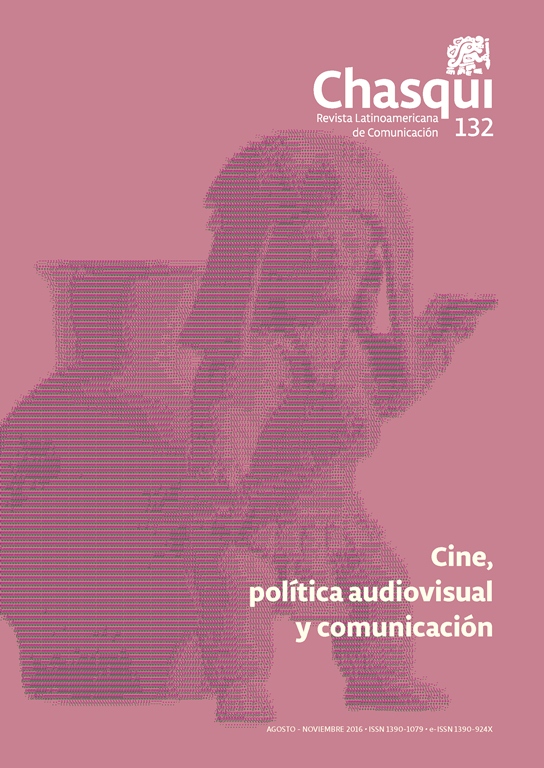La institución de la ciberpolítica: gobernanza y código
DOI:
https://doi.org/10.16921/chasqui.v0i132.2480Palabras clave:
filosofía política, código informático, ciberconservadurismo, ciberlibertarismoResumen
En el presente trabajo se aborda el problema de la manifestación de lo político en el ciberespacio, sosteniendo la hipótesis de que hay un aspecto institucional nuevo y distinto que podemos definir como “ciberpolítica”. Este aspecto se basa en dos fuerzas instituyentes: por un lado, el rol del código informático en la construcción de la arquitectura comunicacional de la red de redes (internet); por el otro, el rol de las comunidades virtuales como sujetos que se ven constreñidos por esas arquitecturas pero que, al mismo tiempo, pueden modificarlas. Estas comunidades se organizan mediante sistemas de gobernanza en red que horizontalizan el poder ciberpolítico, aunque no están ajenas al conflicto.Referencias
Assange, J.; Appelbaum, J.; Müller-Maguhn, A. & Zimmerman, J. (2012). Cypherpunks: Freedom and the Future of the Internet. Nueva York: OR Books.
Botsman, R. (2010). What’s Mine Is Yours: The Rise of Collaborative Consumption. Harper Business.
Gibson, W. (1984). Neuromancer. Nueva Jersey: Ace Books.
Goldsmith, J. & Wu, T. (2006). Who Controls the Internet? Illusions of a Borderless World. Nueva York: Oxford University Press.
Goodin, R.E.; Petit, P. & Pogge, T. (2007). A Companion to Contemporary Political Philosophy. Singapur: Blackwell.
Himanen, P. (2001). The Hacker Ethics and the Spirit of the Information Age. Londres: Random House.
Lessig, L. (2006). Code: version 2.0. Nueva York: Basic Books.
Loader, B.D. (Ed.). (1998). Cyberspace Divide: Equality, Agency and Policy in the Information Society. Londres-Nueva York: Routlegde.
Ludlow, P. (Ed.). (2001). Crypto Anarchy, Cyberstates and Pirate Utopias. Cambridge: The MIT Press.
Mueller, M. (2010). Networks and States: The Global Politics of Internet Governance. Cambridge: The MIT Press.
Mueller, M. (2006) The New Cyber-Conservatism: Goldsmith/Wu and the Premature Triumphalism of the Territorial Nation-State. Review of Goldsmith and Wu’s “Who Controls the Internet. Illusiones of a Borderless World”, Internet Governance Project. Disponible en http://bit.ly/2ervNpG.
Murray, A.D. (2007). The Regulation of Cyberspace: Control in the Online Environment. Abingdon: Routldege-Cavendish.
Raymond, E. (2001). The Cathedral and the Bazaar: Musings on Linux and Open Source by an Accidental Revolutionary. Cambridge: O’Reilly.
Tovey, M. (Ed.). (2008). Collective Intelligence: Creating a Prosperous World at Peace. Oakton, Virginia: Earth Intelligence Network.
Von Busch, O. & Palmås, K. (2006). Abstract Hacktivism: the Making of a Hacker Culture. Londres-Estambul: Bitstream Vera-Lightning Source.
Descargas
Publicado
Número
Sección
Licencia
- Los autores/as conservarán plenos derechos de autor sobre su obra y garantizarán a la revista el derecho de primera publicación, el cuál estará simultáneamente sujeto a la Licencia Reconocimiento-SinObraDerivada de Creative Commons (CC BY-ND), que permite a terceros la redistribución, comercial y no comercial, siempre y cuando la obra no se modifique y se transmita en su totalidad, reconociendo su autoría.
- Los autores/as podrán adoptar otros acuerdos de licencia no exclusiva de distribución de la versión de la obra publicada (p. ej.: depositarla en un archivo telemático institucional o publicarla en un volumen monográfico) siempre que se indique la publicación inicial en esta revista.
- Se permite y recomienda a los autores/as difundir su obra a través de Internet.

